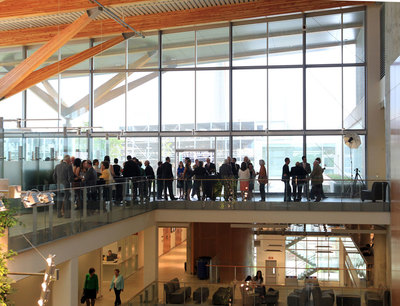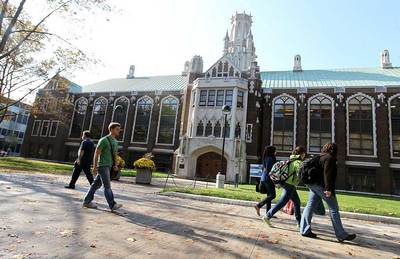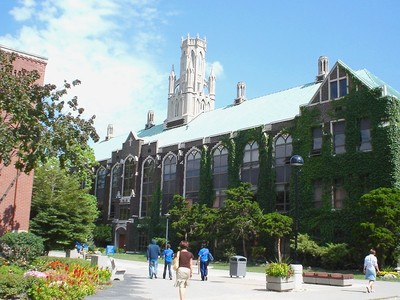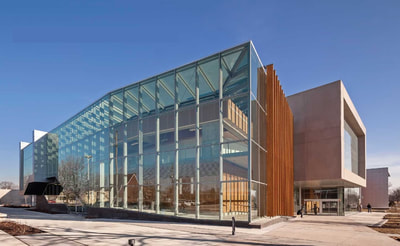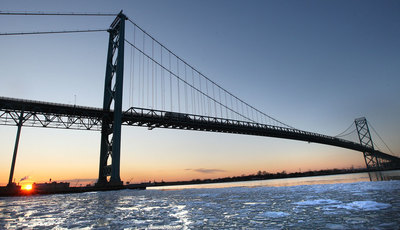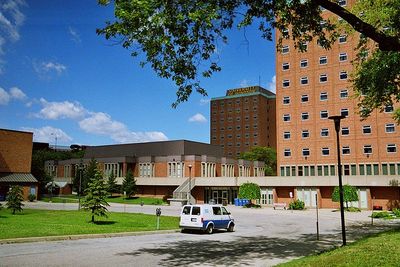สถาบัน University of Windsor
โปรแกรม Environmental Engineering
Ph.D.; M.A.Sc.; M.Eng.
(เมือง Windsor, รัฐ Ontario)
About University of Windsor
มหาวิทยาลัยวินเซอร์เป็นมหาวิทยาลัยรัฐชั้นนำของประเทศแคนาดา ได้ถูกก่อตั้งในปี 1857 ในนาม Assumption College และ ได้ก่อตั้งเป็นมหาวิทยาลัยวินเซอร์ในปี 1962
- สถาบันตั้งอยู่ใจกลางเมืองวินเซอร์
- เพียง 3 ชั่วโมงจากเมืองโตรอนโต้
- สถาบันติดกับแม่น้ำ Detriot River และ เขตเมือง Windsor Detriot Metropolitan area เพียงข้ามสะพานจะถึงประเทศสหรัฐอเมริกา ถือว่าที่ตั้งเหมาะเป็นอย่างยิ่งสำหรับท่านที่สนใจที่จะศึกษา พร้อมหาประสบการณ์ในประเทศแคนาดา และ สหรัฐอเมริกา
Why choose University of Windsor?
- มหาวิทยาลัยวินเซอร์มีชื่อเสียง และ คุณภาพการศึกษาดีเยี่ยม (High Academic Excellence)
- คณาจารย์ และ นักศึกษามาจากทั่วโลก (Truly international)
- หลากหลายโปรแกรมที่น่าสนใจในระดับ ปริญญาตรี ปริญญาโท และ ปริญญาเอก
- หลากหลายสาขาการเรียน
- ได้สัมผัสทั้งประเทศแคนาดา และ ประเทศอเมริกา ซึ่งห่างเพียงไม่กี่นาทีข้ามสะพาน Ambassador bridge (Enjoy the best of both worlds, Canada & USA)
- สามารถทำงานระหว่างเรียนได้ 20 hours/ week
- สามารถทำงานหลังเรียนจบอย่างถูกต้องตามกฎหมาย
About Environmental Engineering Ph.D.; M.A.Sc.; M.Eng.
Doctor of Philosophy (PhD)
An applicant for admission to graduate studies leading to the PhD degree in engineering must normally be a graduate of a recognized university with a master's degree in engineering (MEng) or Applied Science (MASc). Applicants with degrees in related fields will be considered but will normally require strengthening of their engineering background. At the discretion of the Program Graduate Committee, Graduate Record Examinations (GRE) may be required.
Master of Applied Science (MASc) Thesis Option
The MASc is a research-based program in which you complete four graduate level courses and a thesis. You will need an advisor and will conduct research under your advisor’s supervision. This program is designed to be completed in two years. Scholarships and graduate assistantships are available by application. Continuation of your education is possible with this degree.
Master of Applied Science (MASc) Major Paper Option
For the MASc Major Paper option, you will required to take eight graduate level courses and less advanced research is conducted, resulting in a Major Paper over approximately two years. Master of Engineering (MEng) The MEng is a course-based program in which you can complete eight graduate level courses in one year or five terms, including five from your area of specialization plus one more engineering course (from any department) and no more than two non-engineering courses. Alternatively, you may choose to complete all eight courses within your area of specialization. No funding or scholarships are available. This is considered a terminal degree, meaning that you cannot go into a PhD program with this degree.
Courses:
Courses offered by Environmental Enginneering at the graduate level are listed below. Students may take courses other than Environmental Engineering with permission of the Head of the Department and the advisor.
All courses listed will not necessarily be offered in any given year.
93-530. Water Pollution Control
Water quality criteria; methods of wastewater disposal and their effects on ecology; theory and design of different unit operations and processes for water purification; theory and design of different design operations and processes of wastewater treatment; reuse and recycling of wastewater. (3 lecture hours a week.)
93-531. Advanced Water Pollution Control
Discussion on recent advances in the design of water and wastewater treatment plants and new developments in water pollution control practices. (Prerequisite: 93-530 or equivalent.) (3 lecture hours a week.)
93-533. Solid Waste Management
A study of municipal and industrial solid wastes, quantities, composition, methods of disposal or reclamation; economic viability of the various methods related to the quantities involved. (3 lecture hours a week.)
93-534. Environmental Separation Processes
Application of the principles of surface chemistry to separation processes involving phase equilibria, ion exchange, membrane separation, adsorption, absorption, flocculation, spherical agglomeration, sedimentation, filtration, and centrifugation. (3 lecture hours a week.)
93-535. Water Quality Management
Water quality criteria; methods of wastewater disposal and their effects on ecology; stoichiometry, reaction kinetics and material balance; movement of contaminants in water bodies; modelling of water quality in natural systems. (3 lecture hours a week.)
93-537. Kinetics
Basic concepts of chemical reaction kinetics; characterization of chemical and biochemical systems; reactor flow models and consideration of non-ideality. (3 lecture hours a week.)
93-538. Biological Treatment of Wastewater
Wastewater characteristics; biological kinetics; flow and loading variation; wastewater treatment processes; mass balances; aeration; sedimentation; lagoons; fixed-film processes; sludge characteristics. (3 lecture hours a week.)
93-539. Industrial Wastewater Treatment
Sources and characteristics of industrial wastewater; pretreatment and primary treatment; physical and chemical treatment; biological treatment; waste minimization; treatment of wastes from various industries. (3 lecture hours a week.)
93-540. Numerical Modeling of Heat and Mass Transfer and Flow in Porous Media
Introduction to finite difference and finite element approaches for simulation of the diffusion and the advection-dispersion equations; development of finite difference formulation of 1-D and 2-D transient heat transfer, nonlinear conductance and source/sinks; 1-D and 2-D mass transport with reaction; 1-D and 2-D heat transfer with finite element approach. (3 lecture hours a week.)
93-541. Air Pollution from Mobile Sources
Air pollutants; emissions from vehicles; testing vehicles for emissions; combustion thermodynamics; thermodynamics and kinetics of pollutant formation; measures to reduce emissions; modeling. (3 lecture hours a week.)
93-542. Air Pollution Modelling
Air quality standards; emission inventory, source estimation; development of transport models; models with chemical reactions. (3 lecture hours a week.)
93-543. Occupational Hygiene and Pollution Prevention
This course touches on an area of Environmental Engineering not currently covered in detail by other courses: the indoor environment. As well, students are introduced to the definition and methodology of pollution prevention (P2) in industrial settings. Topics include: environmental stressors, provincial and federal regulations, toxicology of contaminants, surveys of workplaces, measurements of airborne contaminants, engineering controls and steps in pollution prevention. (3 lecture hours a week.)
93-550. Sustainability: Principles and Practices
This course examines the evaluation, design, and management of products, processes, or projects to achieve sustainability. The main topics include: assessing and scoping environmental effects from engineering and other technical activities; eco-balance approaches; life cycle assessment; design-for-environment principles; and decision making for environmental and sustainability objectives. The course will discuss typical examples (e.g., automobiles, infrastructure, electronics), and also draw upon the industrial and research experience and knowledge of the class attendees. Class-based projects will focus on understanding, interpreting, and implementing the knowledge acquired. (Not open to students who attended 93-532, Engineering and the Environment, since 2002.) (3 lecture hours per week.)
93-590. Special Topics In Environmental Engineering
Selected advanced topics in the field of environmental engineering. (3 hours a week.) Current topics include: Air Pollution Control; Transport Phenomena; Environmental Law and Policy Atmospheric Chemistry and Physics of Air Pollution.
93-595. Graduate Seminar
Presentations by graduate students, faculty and visiting scientists on current research topics. This course will provide students the opportunity to recognize new developments and technology in the field, to critique others’ findings and to construct and present their ideas and results. Full time graduate students are required to register in every semester offered and give a presentation in the semester prior to thesis defence. All graduate students are expected to attend each and every seminar and no less than 75% of all seminars. This course will be graded on a PASS/FAIL basis (1 lecture hour a week) (Also offered as 87-595)
93-796. Major Paper
93-797. Thesis
93-798. Dissertation
Admission Requirements:
English: one of the following
- TOEFL: 220, IBT-83
- IELTS: 6.5
Contact Us
หากน้อง ๆ หรือคุณพ่อคุณแม่มีคำถาม หรือสนใจรับโบรชัวร์ สามารถแจ้งได้ที่
ออฟฟิศแปซิฟิคสาขากรุงเทพฯ
(083) 358-7000, (086) 881-3084, (085) 658-7000
ออฟฟิศแปซิฟิคสาขาแวนคูเวอร์
(778) 995-4763, (604) 716-0478
พี่ ๆ ทีมงานยินดีพร้อมประสานงานและบริการการสมัครวีซ่าประเทศแคนาดาและวีซ่าอเมริกาอย่างครบวงจรค่ะ นอกจากนี้จะมีทีมงานต้อนรับและศูนย์แปซิฟิคสาขาเมืองแวนคูเวอร์ค่ะ


